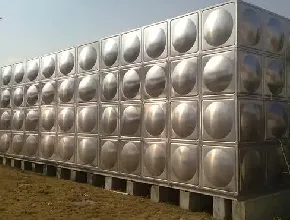loading...
- No. 9, Xingyuan South Street, Dongwaihuan Road, Zaoqiang County, Hengshui, Hebei, China
- admin@zjcomposites.com
- +86 15097380338
- Welcome to visit our website!
Durable FRP Stair Treads for Safety and Slip Resistance in Various Environments
Understanding FRP Stair Treads A Comprehensive Guide
When it comes to enhancing safety in both residential and commercial environments, FRP (Fiber Reinforced Polymer) stair treads play a vital role. FRP stair treads are designed to provide superior traction, durability, and resistance to the elements, making them an excellent choice for various applications. In this article, we will delve into what FRP stair treads are, their benefits, and where they can be effectively utilized.
What Are FRP Stair Treads?
FRP is a composite material made from a polymer matrix reinforced with fibers, typically glass fibers. This unique combination results in a lightweight yet highly durable product. FRP stair treads are specifically engineered to be installed on stairs to enhance grip and reduce the risk of slips and falls. They can be applied over existing stairs or as part of new stair constructions.
Benefits of FRP Stair Treads
1. Safety One of the primary reasons to use FRP stair treads is their slip-resistant surface. The tread design often includes a textured surface that significantly reduces the likelihood of accidents in both dry and wet conditions. This makes them particularly valuable in areas where hazards may be prevalent.
2. Durability FRP materials are known for their exceptional strength and resilience. They are resistant to chipping, cracking, and corrosion, which is critical in environments exposed to harsh weather conditions or chemical spills. This longevity means that they require less frequent replacement compared to traditional materials like wood or metal.
3. Low Maintenance Maintaining FRP stair treads is relatively straightforward. They are easy to clean and do not require regular sealing or painting, which saves time and costs in the long run.
4. Aesthetic Appeal Available in various colors and finishes, FRP stair treads can enhance the visual appeal of a space. Whether you’re aiming for a modern look or a more classic finish, there’s likely an option to suit your aesthetic requirements.
frp stair treads

5. Environmental Resistance Given their composition, FRP stair treads are inherently resistant to moisture, mold, and UV rays. This makes them an excellent choice for outdoor stairways, walkways, and any area where exposure to the elements is a concern.
Applications of FRP Stair Treads
FRP stair treads are versatile and can be used in several different settings
- Commercial Buildings Grocery stores, shopping malls, and office buildings often face high foot traffic, making the safety of stairways a top priority. The slip-resistant nature of FRP treads can help prevent workplace accidents.
- Industrial Facilities Manufacturing plants and warehouses can benefit from FRP stair treads due to their ability to withstand heavy loads and resistance to chemical exposure.
- Healthcare Settings Hospitals and clinics require materials that are easy to clean and disinfect. FRP treads meet these needs while also providing a safe walking surface.
- Residential Use Homeowners may choose FRP stair treads for outdoor decks and pool areas, where slippery surfaces could pose dangers.
Conclusion
In summary, FRP stair treads offer a combination of safety, durability, and aesthetic appeal that makes them a wise choice for a variety of environments. Their resistance to slips, along with low maintenance requirements, makes them an ideal solution for enhancing stair safety. Whether for industrial, commercial, or residential applications, investing in quality FRP stair treads is a decision that prioritizes safety and efficiency. If you're considering an upgrade to your stairways, FRP stair treads could be the ideal choice to meet your needs effectively.
-
The Rise of FRP Profiles: Strong, Lightweight, and Built to LastNewsJul.14,2025
-
SMC Panel Tanks: A Modern Water Storage Solution for All EnvironmentsNewsJul.14,2025
-
GRP Grating: A Modern Solution for Safe and Durable Access SystemsNewsJul.14,2025
-
Galvanized Steel Water Tanks: Durable, Reliable, and Ready for UseNewsJul.14,2025
-
FRP Mini Mesh Grating: The Safer, Smarter Flooring SolutionNewsJul.14,2025
-
Exploring FRP Vessels: Durable Solutions for Modern Fluid HandlingNewsJul.14,2025
-
GRP Structures: The Future of Lightweight, High-Performance EngineeringNewsJun.20,2025
